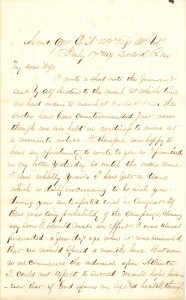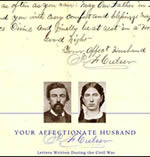 [google-map-v3 width=”400″ height=”300″ zoom=”12″ maptype=”hybrid” mapalign=”right” directionhint=”false” language=”default” poweredby=”false” maptypecontrol=”false” pancontrol=”false” zoomcontrol=”true” scalecontrol=”false” streetviewcontrol=”false” scrollwheelcontrol=”false” addmarkermashupbubble=”false” addmarkerlist=”33.866348; -84.46611{}1-default.png” bubbleautopan=”true” showbike=”false” showtraffic=”false” showpanoramio=”false”]
[google-map-v3 width=”400″ height=”300″ zoom=”12″ maptype=”hybrid” mapalign=”right” directionhint=”false” language=”default” poweredby=”false” maptypecontrol=”false” pancontrol=”false” zoomcontrol=”true” scalecontrol=”false” streetviewcontrol=”false” scrollwheelcontrol=”false” addmarkermashupbubble=”false” addmarkerlist=”33.866348; -84.46611{}1-default.png” bubbleautopan=”true” showbike=”false” showtraffic=”false” showpanoramio=”false”]
Head Qurs. Co. “A” 129th Regt. Ills. Vols.
July 17 1864- 2 o clock P.M.
My Dear Wife
I wrote a short note this forenoon & sent by Alf Huetson to the mail,1 at which time we had orders to march at 3 o clock P.M. The orders have been countermanded just now, though we are held in readiness to move at a moment’s notice.2 I therefore am happy to have an opportunity to write to you as I promised in my letter yesterday, so until the orders come I am wholly yours.
I have felt a desire which is daily increasing to be with you during your anticipated trial in August.3 If there was any probability of the Campaign closing very soon, I should make an effort. I was almost persuaded a few days ago when it was rumored that we would spend a month here, but, now as we commence the advance upon Atlanta, I could not expect to succeed. We will hope, however, that if God spares my life and health through the balance of this Campaign, we may have the joy of greeting each other again. We live in hope and trust all to God.
While engaged in marching and fighting, I do not think of Home so constantly, but, for the last eleven days laying here, it has been constantly in my mind. I have felt considerable uneasiness during the past few days as no letters have arrived. The last one received was dated June 30th. To most men who seldom receive more than two or three letters a month, there would be no alarm, but you have written so punctually every few days that I have feared you were sick. You do not know, perhaps, how dependent I am upon the knowledge of your good health and happiness for my own happiness and contentment.
The greatest desire I have after the performance of the duty I owe to God and my country is to be worthy of your Love and Confidence, and to contribute all in my power to your happiness. Nothing but a full conviction of duty could have induced me to leave you thus alone for so long a time. I know you feel lonely and desolate at times and especially under your present trying circumstances, but I feel that “Our Father in Heaven” will sustain you and deal kindly with you. Did I not feel so confident that Mother [Murphy] will do all she can for you, and knowing her thorough knowledge and ability to do more for you than I could, I should feel very uneasy. But it is almost an impossibility, and I do not even anticipate my ability to be with you so soon, even should everything here move rapidly and victoriously forward.
The 14th Corps is crossing the river to-day, & I think all the army is over except the Cavalry and our corps.4 Quite a large body of troops have been left at Marietta & vicinity to guard our communications, while troops are almost daily arriving from the rear.5 Lieut. Scott arrived on Friday last;6 he was wounded at Resaca & has been home. Quite a number of those slightly wounded are returning.
The weather to-day has been very pleasant. It rained last night, and the air to-day is quite cool. This climate is not as severe as I expected, though it is very warm some days. We feel very much refreshed by our rest here; this makes the 11th day we have been in camp. Our supplies have been abundant. Rations of beans have been issued every few days, also dessicated potatoes & rice. The men have been troubled with diarrhea caused by eating berries and green fruit, I presume, but they will soon get over it when we get to marching again.
All are in good spirits. Our Sunday School this morning was very profitable, there were about 30 present. Lt. Scott preached a very good sermon. We have been holding meetings every evening for some time past, and a very excellent state of feeling exists. I did hope to have an opportunity to-day to write to the Sabbath School, but unless we receive orders to remain here for the night I could not undertake it.
There has been very heavy cannonading over the river all day.7 Rumor says the Enemy made a desperate chase on Friday night-last [the 15th] but were repulsed with very heavy loss.8 Everything in this department has been entirely successful. God has been with us and signally blessed every effort we have made.
I have not heard from Bro. John or Sammy yet, but may meet them over the river. The mail will be in by 5 o clock, & I hope will bring a letter for me. Remember me kindly to all the S. School children and all our friends. Give my Love to Mother and Maggie. Why is it they never write? Do you ever hear from Carlisle? I presume the raid into Cumberland Valley will cause considerable excitement there.9 I have written several letters but get no reply.
Write as often as you can. May our Father in Heaven bless you. Please accept all the love and affection of my heart and be assured that you are dearer to me than all of Earth beside.
Your Affect. Husband
J. F. Culver
- The “short note” is missing from the Culver Collection. [↩]
- General Thomas, on the morning of the 17th, ordered General Hooker’s XX Corps to cross the Chattahoochie at Pace’s Ferry. As the XIV Corps was crossing, Hooker was to regulate his movements accordingly. This was the reason for the delay. O.R., Ser. I, Vol. XXXVIII, pt. V, p. 161. [↩]
- Mary Culver was eight months pregnant. [↩]
- General McPherson’s and Schofield’s armies were south of the Chattahoochie and feeling their way toward Decatur General Howard’s IV Corps of Thomas’ army, having crossed the Chattahoochie at Power’s Ferry, covered the crossing of the XIV Corps at Pace’s Ferry. J. F. C. was mistaken on one point; Brig. Gen. Kenner Garrard’s cavalry division was across the Chattahoochie, screening McPherson’s left flank, and preparing for a dash on the Georgia Railroad, east of Decatur. Ibid., p. 158. [↩]
- A brigade of infantry was posted at Kennesaw Mountain and Big Shanty to protect the railroad near Marietta. Three regiments, one from each army, were posted at Marietta to unload cars. Brig. Gen. John E. Smith’s division of McPherson’s army guarded the railroad from Allatoona to Cartersville. Ibid., pp. 112-113. [↩]
- Abel H. Scott, a 37-year-old minister, was mustered into service on Sept. 8, 1862, as a sergeant in Company F, 129th Illinois Infantry. He was promoted to sergeant major on March 7, 1863, and three months later, he was commissioned 2d lieutenant. Lieutenant Scott was wounded in the left hip at Resaca on May 15, 1864, and was hospitalized until mid-July when he rejoined his company. On Dec. 29, 1864, Scott was mustered in as regimental chaplain to replace Brother Cotton. Compiled Service Records of Union Soldiers, NA. [↩]
- McPherson’s and Schofield’s columns, as they forged ahead, skirmished with Confederate cavalry. A Rebel battery, supported by infantry and emplaced in a redoubt north of the railroad, engaged in a duel with cannoneers of the 11th Indiana Battery. During the afternoon, the Southerners limbered up their pieces and retired across Peachtree Creek. O. R., Ser. I, Vol. XXXVIII, pt. V, pp. 158, 160. [↩]
- There was no substance to this rumor. On July 16 the regimental historian reported, “Not a single shot was fired by the pickets of our brigade at the Rebels, or by those at us, but the Rebels were prohibited from speaking a single word to our men and would not allow them to go into the water. Our men were generally out of tobacco and continually asked the Rebels for some, who did not answer, but now and then tied a piece of tobacco on a stone, and threw it over the river.” Grunert, History of the 129th Illinois,. P- 83. [↩]
- A powerful column led by Lt. Gen. Jubal A. Early had advanced up the Shenandoah Valley, crossed the Potomac, and on July 9 occupied Frederick, Md., defeating a small Union army in the battle of Monocacy. Early’s army then threatened Washington. But on finding that the force holding the capital city had been heavily reinforced, Early, after demonstrating against Fort Stevens, retired and recrossed the Potomac into Virginia. [↩]

 Subscribe via RSS
Subscribe via RSS Subscribe via Email
Subscribe via Email